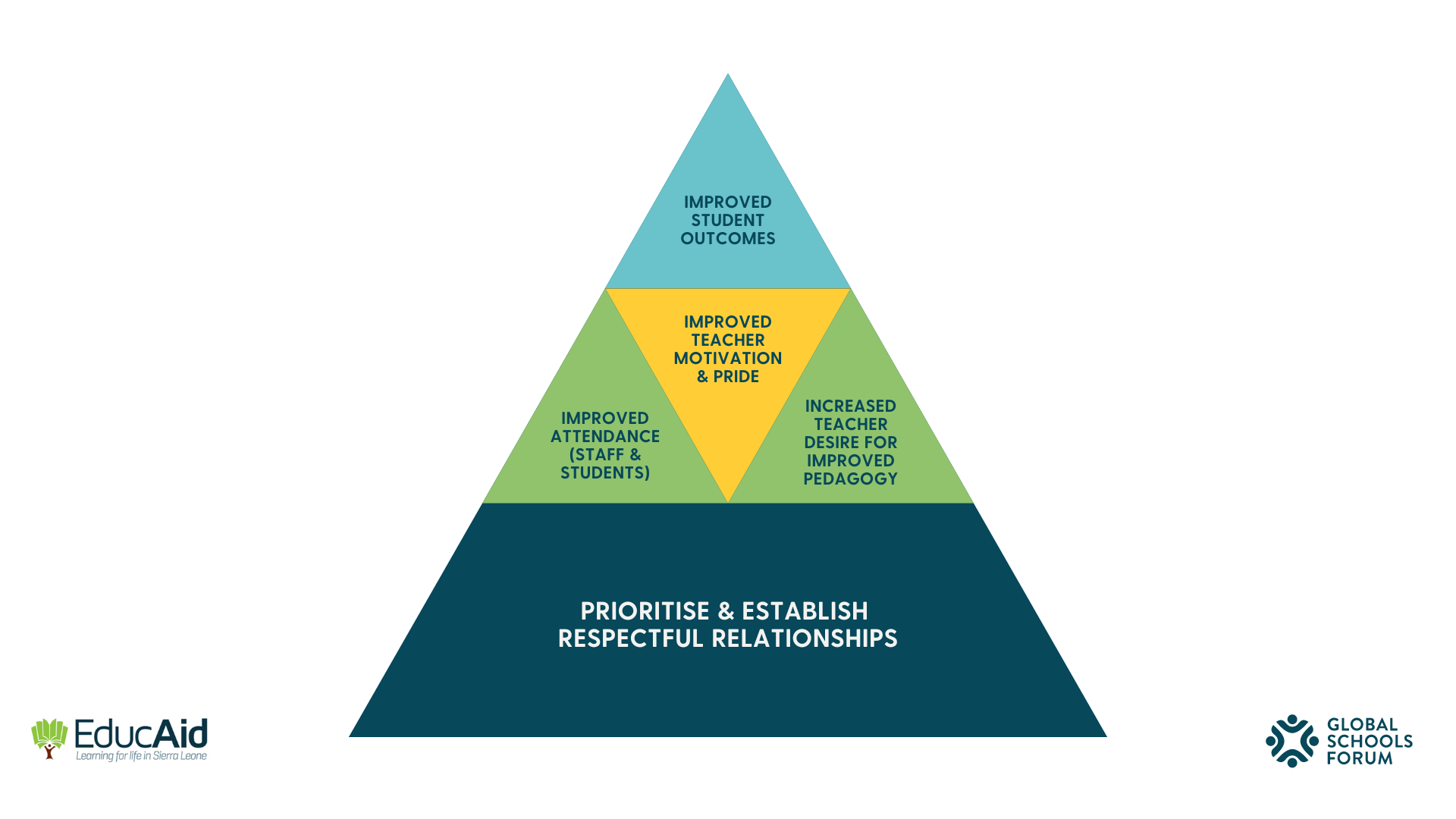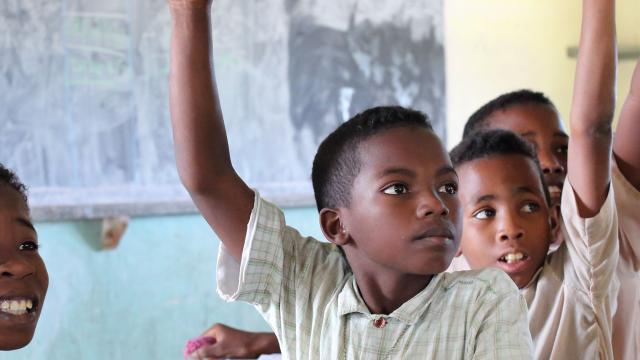This blog is an opinion piece by Miriam Mason-Sesay, introducing an urgent need for a generational firebreak across education systems.
Limiting teacher mindset has its roots in the past
The colonial education system tended to be autocratic, focused on academic prowess alone, with little understanding of the idea of preparing young people for the world of citizenship, relationships, and work. In a colonial school, the classroom was commonly one where the teacher was seen as all knowing. Controlling and enforcing learning was the primary role of the teacher since discipline was the necessary foundation to society and needed to be guaranteed, even with the use of corporal punishment if required.
This mindset is still prevalent in many former colonies, and Sierra Leone, where EducAid works, is no exception. Often historical practices continue because opportunities and incentives to rethink are rare. Instead, the mindset may also be reinforced by present-day teacher training institutions which have not rethought their teaching methods for decades.
Our own experience of school forms us as educators
We bring to the classroom what we have experienced and know. As teachers and educators, we carry an image of what a school is. This image is a product of how we experienced teaching, as students. If this image is not disrupted, it is highly probable that how we teach and what we expect students to learn will also not change dramatically. Even teachers who despised school as students, often maintain that image and their own experience of schooling will likely continue to dominate their perceptions and actions as a teacher.
Teachers of today are, by definition, a product of school systems from the past. Accordingly, most present-day school systems continue to deliver a set of experiences in direct opposition to healthy and joyful learning. Educators often bring a less than ideal understanding of what the role of a teacher is.
We need a generational firebreak

Living in Sierra Leone, where the dry season will see crazy wildfires break out and sweep across great swathes of land, we are used to the need to set up firebreaks: bands of clean land are created to break the fire’s path and stop the damage spreading. The fire cannot jump across the firebreak and the next part of the farm or forest is protected from fire damage. Learning from these firebreaks that protect the countryside, I believe that what we need in education reform is a generational firebreak. We need something that will stop the inevitable and unthinking spread of damaging practices from one generation
of educators to another and give the next set of teachers and students the opportunity to rethink and come up with ways of working that serve the needs of today’s young people.
Tweaking alone is insufficient
Too much of what happens in teacher education (pre-service and in-service) is about tweaking the old system rather thanroot and branch recreation. We need to achieve a clean break with what was envisioned and create something completely new. Teachers who have been raised on a diet of ‘spare the rod and spoil the child’ need more than a strict ban on corporal punishment. Such measures will be insufficient when rethinking the whole relational paradigm. Too often when told that the cane is not allowed, the question becomes, ‘Well, if I can’t hit them, how else will I punish them?’ Whereas the need is for a complete break with the antagonistic ‘us versus them’, ‘you will learn because I’m going to make you learn’ approach to running a classroom. It may even be frightening initially for teachers who expect their authority to be based on fear rather than the co-creation of learning by teachers along with excited, enthusiastic students, but our experience tells us that it is possible.
Developing respectful relationships is key
At EducAid, when we identify deeply engrained behaviours and expectations that we see are not serving the needs of our children, we try and stand back and engage in re-envisaging, rethinking, and re-creating.
Ensuring child safeguarding as a key intervention, we introduced a behaviour management policy which not only banned corporal punishment but also banned humiliating punishment and then, to some teachers’ total disapproval, banned all punishment and placed emphasis on prevention and restoration. We realised that the time, care, and energy investment in building relationships is a new model and requires a break with old thinking. Usually, both within our own schools and within our partner schools, it is necessary to take staff on an emotional journey and remind teachers what it feels like to be ‘punished’ and the lack of desire for cooperation it induces to wake people up to the need and rewards of a new way. We learned that experiential learning is important, and theory doesn’t cut it.
If you have ever had to create a firebreak to protect your land, you know it is a lot of hard work but you also know it prevents you having to restart your farm and rebuild your damaged buildings when a fire breaks out but cannot touch your property. The investment is worth it. When you want to create a generational firebreak and protect the next generation of educators and learners from the old ways of relational damage and teaching without learning, it takes effort, it takes empathy, it takes courage, but it is possible. For us, the key each time is respectful relationships. Ensuring respectful relationships, creating listening classrooms where children feel safe enough to take risks in their learning, role-modelling, and requiring trustworthiness - these practices will require a complete rethink!
Teachers who were taught through rote learning will need more than a scripted lesson plan for them to start creating space for working out solutions to problems, discussing and defending ideas, researching in the face of real challenges, helping a colleague understand a different perspective, listening to a classmate’s views and adjusting your proposal in the face of it. It is impossible to practise and embody what you cannot imagine so reimagination is crucial.
Rethinking foundation learning through building relationships
And what does this have to do with foundational learning? We are asked sometimes to support partner schools in developing their ability to deliver foundational learning. And our answer is ‘No, not unless we can first support you in rethinking your classroom relationships.’
Once respectful relationships have been established, this can be the foundation for a complete rethink of pedagogy. It may be that teachers need new techniques and approaches and content knowledge, but they will not see this need until they start to have a different vision of what a school can be. Our experience at EducAid has taught us that often, as relationships in a school improve, students feel safer and learn better. The learning outcomes improve, and students start coming to school more often. As their attendance improves, they have the opportunity to learn more, and their outcomes improve further. Teachers are also prouder of their own work and become more engaged and feel more convinced that they can improve and change their pedagogical practices.

Respectful Relationships are the foundation for the reform of all aspects of school life, classroom management & teaching and learning
We are using the concept of the generational firebreak to challenge and change different aspects of our lives and work. Another example is the opportunity to address damaging norms around the relationships between the sexes and we are seeing young men and boys, excited and proud to be anti-violence and breaking from their fathers’ more patriarchal role-model.
This is our experience of the generational firebreak. We would love to hear yours.
About Miriam Mason-Sesay
British trained teacher, Miriam has been leading EducAid Sierra Leone for 23 years and is passionate about the power of a values-led, respect-focused education to transform lives and communities.
Do get in touch and let us know, by responding to the blog or emailing miriam@educaid.org.uk.
This blog was conceived during the Community of Practice on Foundational Learning organised by Global Schools Forum, which brought together more than 14 member organisations working across low-and middle-income countries.

